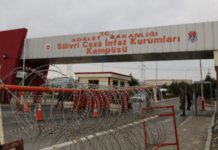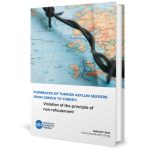The Association of Lawyers for Freedom (ÖHD) has accused prison authorities in southeastern Turkey of systematically subjecting visitors to the facility, particularly women and children, to degrading and unlawful searches, including forced removal of clothing and invasive physical contact, the Mezopotamya news agency reported.
In a report released this week the ÖHD detailed serious rights violations at the Urfa No. 2 T-Type Closed Prison, based on interviews with 20 people who recently visited inmates. Most of the inmates in question are serving sentences on charges related to membership in the Kurdistan Workers’ Party (PKK), designated as a terrorist organization by Turkey and its Western allies.
Aynete Bulut, who traveled from Batman province to see her son, described the treatment she faced: “They make us remove our headscarves and search our hair. They strip us of our clothes. We see this as harassment and do not accept it.”
Rahime Alper, who traveled from Adıyaman province to visit her son, described similar treatment. “We are subjected to these searches every time we come. We travel for hours to see our children and are met with this treatment. It’s been 19 months, and nothing has changed,” she said.
Of the 20 people interviewed for the report, 12 said they experienced invasive search procedures, including strip-searches and physical contact with intimate areas. Nine of those 12 were women, according to the report. The report indicates that searches included the forced removal of headscarves, the inspection of undergarments and scrutiny of personal items like hair accessories.
“These practices are non-consensual intrusions into individuals’ private lives and bodies, with no legal or ethical justification,” Emre Çaylan, coordinator of the ÖHD’s Prison Commission, said. “The systematic and arbitrary nature of these searches clearly reflects a pattern of institutional abuse.”
According to Turkish legal regulations, strip-searches can only be conducted in exceptional cases, such as when there are credible indications that the person has contraband materials on their person. In such cases, the search must be conducted in a manner so as not to humiliate the individual and must be performed as quickly as possible. When there is a credible suspicion that something is hidden inside the person’s body, officers are required to ask the person to remove it themselves and inform them that if they disobey, the removal will be performed by the prison doctor.
The ÖHD believes the aim of such treatment is to deter families from maintaining ties with inmates. “By making visitation a humiliating ordeal, authorities are trying to isolate prisoners and punish their families,” the report claims.
The organization is calling for urgent intervention by the Ministry of Justice and the Human Rights and Equality Institution of Turkey (TİHEK). It demands that all search procedures be revised to comply with legal norms, uphold the principle of proportionality and respect human dignity.
The group also insists that searches be gender-sensitive and carried out only by staff of the same gender, and that all forms of invasive searches be banned except by court order and only as a last resort.
The report comes amid growing concerns about systemic abuse in Turkey’s prison system. For 2023 the Human Rights Association (İHD) documented more than 23,000 rights violations in 147 prisons across the country, including incidents of torture, medical neglect and arbitrary disciplinary practices. The United Nations Committee Against Torture has also urged Turkey to address the persistence of ill-treatment in its detention facilities and the lack of accountability for those responsible.















